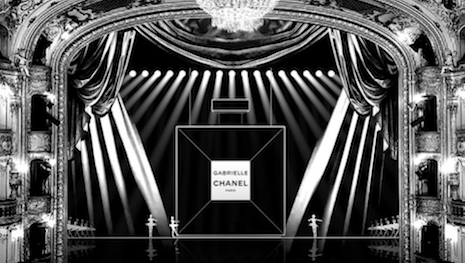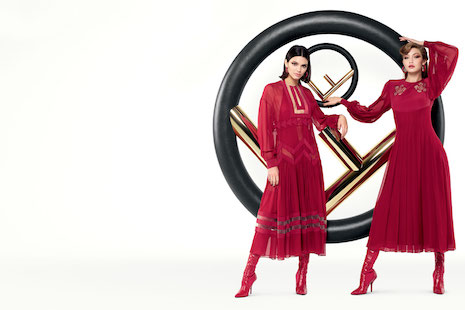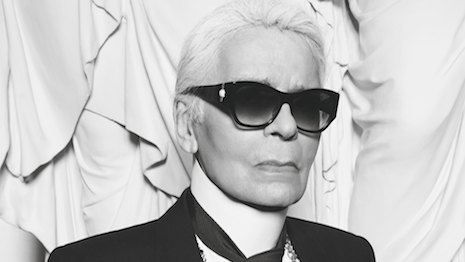Famed German fashion designer Karl Lagerfeld is notorious for his controversial and sometimes offensive statements, but a series of remarks made on French television this past weekend may have been one of the most shocking public moments for him.
On a French talk show, Mr. Lagerfeld described refugees from predominately Muslim countries as the “worst enemies” of Jewish people and compared Angela Merkel’s policies of granting asylum as akin to the Holocaust. While the designer has said some outlandish things in public before, his latest comments go much further and put Chanel and Fendi, of which Mr. Lagerfeld is the creative director, in the awkward position of dealing with a public figure in the company who is facing outrage.
Inflammatory remarks
Mr. Lagerfeld is no stranger to controversy.
While he has made multiple comments in the past that have landed him in hot water, they mainly consisted of him insulting other prominent people, mainly women and mainly for their looks.
Of course, belittling women’s appearances has its own political implications, but Mr. Lagerfeld’s latest comments saw him delving much further into one of the most divisive political questions of the moment.
Speaking on the French talk show Salut les Terriens!, Mr. Lagerfeld warned the audience that he was about to “say something horrific.”

Chanel has yet to comment on Mr. Lagerfeld's statements. Image credit: Chanel
He went on to spend several minutes criticizing German chancellor Angela Merkel for allowing refugees from countries such as Syria into Germany, implying that they are criminals and would not fit into European society.
As bad as it is to disparage the millions of men, women and children fleeing war and famine as criminals, where Mr. Lagerfeld really touched a nerve was by evoking the Holocaust in his remarks.
“One cannot – even if there are decades between them – kill millions of Jews so you can bring millions of their worst enemies in their place,” Mr. Lagerfeld said.
The irony of his comments is that he implies Muslims are the worst enemies of the Jews in the same breath that he evokes an atrocity committed against them by Europeans. Additional irony comes from the founder of Mr. Lagerfeld’s’s own brand, Coco Chanel, being a notorious anti-semite and potential Nazi collaborator herself (see story).
Streisand effect
Mr. Lagerfeld is an influential figure and his associations with Chanel, Fendi and his own namesake brand have inevitably cast a bad light on those brands.
At this time, none of the three brands nor Mr. Lagerfeld himself have issued any statement on the remarks. None of the brands responded to a request for comment.
Chanel and Fendi’s silence is understandable, if not defensible. A very real concept in public relations is the Streisand Effect, the idea that trying to cover something up or downplay it will only bring more attention to it.

By ignoring the comments, these brands may be hurting themselves even more. Image credit: Fendi
On some level, Chanel and Fendi must not think Mr. Lagerfeld’s comments a big enough deal that the potential extra attention brought to them by addressing them is outweighed by the potential damage control possible.
However, this ignores the moral value of addressing and condemning wildly offensive statements from a representative of the brand.
From a brand’s perspective, the deciding factor of whether to respond or not rests entirely on how to avoid lasting damage to the brand image. But from a human perspective, comments that denigrate a downtrodden and marginalized group of people, using inflammatory rhetoric that unfairly ties them to one of the worst atrocities in history, should be condemned immediately, regardless of how much attention is being paid.
{"ct":"AFoHLMNmghDDK7T+bNhurzzaMYx9dvEJI+vnAvCH0MHhbpN+wx\/xFzzYVb9l8XPCsBsTM6uDgBA7f5V1TroTqUOusd\/SEKkOgjx3PGXQL3trqXFKca3VRn6mpXyo\/nBez4TK182DKn1PW4ObbbWLMCe7hp7aRSySmVdHEFhv4qSQzS+J4FpS\/LBT98bkVm1wE4bjnDbe7yEOrRdN4BzTiwNUZbXqzOaMzNPn424QtrkciS0xwACpOZp9UGYVRLs1JzqBHg9Luodq04N8ZUNAzoLYGl0bSSvmYR41tcXoW23IuRniMi6X5m94oXneCdAwRXq3JcWAOs0VNWO9juvk3NN1TgjvxI\/QuQjzmMn6jhCA7sj17CjM3UB7dUF9JdE3dooDfatkfauBKsRv482bGU2eQ7lalfxgj8uBruVXLmsgXdtiyU5o6lwj7RtomR+kN69uY7kMt0q5jQ\/2\/pWCTz5MzVq57K9uoZh+DiKEhIuRWVZZ2Bg2\/XMnvx614iaBHR4Myv46ZJ3CZdh94AR\/0gFHSr6vuPgghYM9Oad8SCxRsFzvxkhLdozT9eaNIeg13ahzHuGLkXXAnm+LtvWM1mf9kSYaFfQtF+nzgFrNzDeI0mzh3XveQXq0cM9hjLCiY0gzHPndCNXH6KiOT88OkLLIE6HYrpGqu4o3tQeKcDK4x0d0fjRdKuAw0OVKKI3cnm5MeeJdpBHQw1xWgXU\/0VBmHn6jAjQPxR17zwU07Fc+X+RHu6X+wpMps3kw3QKPpgGSkaf\/Bg75xGiwGOemv\/f7EPIzvDdS\/IlujEbpZbQa2\/Nctd5dvlUGJGF5jXHLttYM9canj8mjs8HsXonrWmIp7iuuHJGmYTq1NeOkm0zzErr6AJiK0r+yrEW3EQOaHBoCQtFHWaXxFewy3CeVpKWl8nnTAowHJg79Ymc9INkgjkuRM4ofKlcdWEO+oX6dDHFso6Id1NHDYPtUxmyD25SBuUkg3tV4aIMGJfSXQSEgD6ARkH3uyInPRdl4VAbFOMyKS6lg6GUdk08OZh3GcL7NBXtElAvG0MMtJfwThtEqlX0rAJOjKUBfMp153D29NTYc7ILaYBqmbRS730nxvd1K43iscTyver7rMikThf1umNBZ5H6DS91TKmFr7eJ2qf0C+D8+FqXf4U9CoHIuIqawg6SFTjhvrElm3aMvEYuY3FGT\/Pxxz+do0B52po02y\/rVj23gMI8tZ1XTvlg7zTFQN26dNlIYOUJnNk1V7pztzSXX6CW26ukBRsLKjHt98EVBLlI5MMh1sCDFGnaWG8o7MNZfuNhj9bHddDnr2WoGrM\/WF2KWp3yy1PrhOd2g0wJaj6uhLt1u2pprYJuh7ZQww32hVRphPIDPPaSatREOynlck1k13mvBgx\/pq3\/zDVF8yqY5vLuu2wHwB7MhZGzQfnZZxI6Z4c3YkXg6nrBBRIyWn98OTEdlEw5\/pwz8G6XTvJqPro0rvd3jOZDKK62F2sDDpFErj\/jhsh\/lOmoSUrxdQwObeepP0UUWRQKh8E3hVVRmjfl+fVUZVDyqZcxThXSrmE4zeyNHDpt+2ZozSYiKTvPmyqkupMNWU5nLm00zedCl1q9Mt9H7z0yuS32ZC\/Z6nNN1rvPeZsyUj8+beeVxyW26e2hqRo7aAxkp2YGuWhSXEqNe9VhLOUIt60XP1u8tV4QLuz+HOFba0a8aaXk1Eg1Pf2JN2n1mIS5pGV4mjaXgnoMAukZTXPQk+hwVebAdcmm+wgM9XQ06QfwIb3k3zrVViaxUcrRxPeLv9kz4QsaTurpXL6F68NWOLwoZKGTmNKO\/8XFMYJZbS7\/WB9bHZfskXhjfTG0SupLJWOrhaFsZ1qd+xAaYsjbD09xGdNqIY+HlLLtOVzpG3XP7vFOzTsPaPI+FU+WO+cwyaFT9s7ucOMDe4k8MVKREayDz4XOb9e8+TKWIBqLXVjyNTMlF0A+7Mqwn79InAZ0+E3fLqaEP1FJF\/wMvfXS4THYEqbgefV6ueAehl8Wsukr\/fX7erlvgezzyQnQfss+93FoIJGRvLhd1USQBLlxtAGAGW4b57kNJGdyvftaePqzB\/trtU59GjNIJyQSQ7lFNDl0ESGl9JlvnKkmI6m9t2Cy0EASdKmdwMRBjpBknKAecSPxwfXpcYsdszYo6m6l5mxhJgLkZn2XXyu3uqraQTPsHenzo0FiTtPLwKo5y+L4tS4noEqW4iC8rIVx\/8drQShzjnzJx\/4cp5Pt8OAercNJYKGRb8NSi3PvgWouYV5PN97KtCsHEBs6AfAE1Bp6aTXw1ibdbIUQ6AWBAURlul8++WPdl0eOKy4Yxt+1GsDsWw6fUnLlseQcoVtDE4blOE925kgP1mHQYKSzaOEMdp9n0trp8xOHVCtaP4o5fG6dJWR+EtsQ+l\/j3khKzs780XXZog6gU4uq3opVAyg04zvad3oP38d\/I01+k8prdCwDK3PfqO\/GdBvLaSiqM\/M5YoWV9WvZRPfmh5O7Fg51ffFW3mb3z4miIOx4XjmzZ+vqgk15Xwl4ZsjcSIITZGrpXQL0OsxnUUBZyfQjytocma7K8HTN6+cWwFS+tAPA9JkDGG8tqoeLeb0zkhpDV5\/p6rCxToxUvyIjfBq8eBKm6MmLkpX3w843aihCHE+Aw9jQNuJp8WDnAKPYlnC6MuoKEboRwF3ImjhyYR7g54ac9VTiEkCKPrfO4xA0npLweg77Q\/IFvCzTyoRolnRFpw0leGC\/sjrmHijxtyj5BcqgwKLUcVbz6lFgOaG\/KnyXvgtS6oAbTOBkbWo9Ma\/mybqEJNXMF4G+m9WnypNONCtqwRpXbIHm1IWXi+VozmfOsXSbP7IP0pcSDH5x8paEtKTd9xdf7tXiOF385s6eC+RA5\/CCy9kdt6Fls2Hu7tW3p0ahRF6vI54n926vFF6nPpPO0FMIXp0SMLWuccPHiXNmWhNTpTZTspEfihf8fZOShZmBvFuNlZFwgPYQLrg0ZrSFK8YSNaxC7xIr\/WxnDrAR31LVPRnV0GzYxQZTe\/X5h1Dymr\/idy2C8a8je23UzOBY\/vG+X9sgUgeANYMKhVtmu9WSR9rLwAGuETDYZqLqKHFnBvCE2Nzll3UWlT4ZyYF71QSkE1kCepnFlCVsp86cmjCDJtPZ6ZzAZMAQYdNLK98xTdaoVTK\/g\/uc84xBxZfFLXGPDMaIkoCCXS6qvxqfC6ER5nl7DxDHTgWekZGBg+YrFYI3CIDMqUB82UufLDtNVjpaeS3Ujk8wgA2Y9B\/Xucy1QWtI+Po\/idc9FmFzww\/NVnv7Hqb0alQGfmh6lgFgVEg7bLyly7ybERqfiy9tVWHhRItdUs23FbgD2ynwVH6xoiQQX68RffuURn+sgeVAG1SpuyAlUGNBtPwMBbMd7ca\/u5NprNiTDYfxgIBsf4ZQLk1qo+a6uwmAy2\/nIxYBhFJCkZLKg3CLzO\/IllU\/fr+RZQ+ysNbXk3YgrG1YCH6mtc\/v+jNtLcLiUMlrcEfL2rdmRCuzqviLiQM1y+tURYx9NTblMczMrFjkZxMdrZ\/RYJbdRqjKre0yRWVXmZQRrP7Qskewh0gYtzQ\/ofujl9ezkVgxhdrXc72+WDW1KVxh0jiRPGN0Yo6zEV2EVOUhX9ettXTIFn3i4Yh7xq2EXqqsBDlfXoJUdLYVgew\/GuS1zaeLfQaoxBXxta5PMsjPwhYhGalPLygZe7G61dtg6K3Gul0ZMjqixEHERCyTS4qXD0OYnK0gufqjy7m5iQjQ8EgfxnNXMwmDk+LTalChS\/i6ZJZeMzzxfZboIsMVZLhwm60jBTHF+LQY3m2wmVayub50Uk2wN1LESu4eZW1Ns9Od3Nt5wX0V2uKNoZBjSgtQR5wqmRyJ6T40Wrqx3QaBma62hSXcmSRfgSIsTVp1MZn0QpXM6VzhVTH8tA0YT9dbItLw9MAA5qRFp52X1edrcigp6tzHbrBDUlOdCjes9F2K+m+qvWW2XstQ4BhMe+UYk7Ubei4d0bQxbj7XFlc\/MA0uaqQrvnvZ2hKOd\/MUWPXEjtsO8vvAIpfAc9pam21DQnyQjnqrQDPtv\/uPouhsDvxbfAWQOoUfD7WAB8SeKfzpmKTvy3y+lfRsrh2P+4LzrP0AJFDCc7ymHoqxmO1KVGlUHbWPIBaevDsi82uR6So8SjCIK9o6Oq8ZXwG8cFjtdYc\/BfV6g26Juu5m5KdEhKERa64hm8Dp7tm06Jlu6GGSwmVyYaPaOYorTZFwZHGekfa9bgS3At\/gLu2ItFuFpeLSPDRdufv8A0jlNz8ZB3OttzZGAp+sssBO\/uswZtElqePJLbNGpYZ5SM3ikgwr1EHjzBoTjVQAfxb93v46MJM4ZjSZoqpb\/QM2\/NtjtoHaGK\/3cbRf7jq9A9uydwVclDGUXFHyblAEGYQcuhx+PBc36trA9jM1lfAJOQTdhnELptDpS88p8YJbzS36m72bHmXNsmhpBW19O2bG83BRyxd9E8F8T3972tmBaIuAHDrIyzNf9iGdR9EdcRr68edVSKL31ITImH8MvZC5QwRg8JgqqWLmg1s\/8EwQnM82n8rP1BZMzbcd4whWxrOWNrGZwvbpgILi4e5ALKHNDtkelJpeuGw6bpSSHD9WFBi9Aq3LekA9OLm0mtx2UivUcWX0yhNE3IE+BGmBKYyoyXmCuyAYeIm3P\/EIBhQ9FBDjap6XvFh6lC9Im2R8Tjg8vt7oVSdxh9wWDBm7GGZ1JfdR1h3FAvik3oMJRIddO\/YsKzUA6+1jIW9MXXeSfPrId8DICAMiaINnsDIKht81fGcRnHSkIB9K7tHSis7wcQ4UwFZFLa1RQpH6THRx7mucxUDIs0E3O+pTgv1v70AlGP8KsIJVhbxhX\/sGWbtny+7Il7jg8OMteY5gLJovPKWXX1ASrJm79LuUYv52UCWCjTOaaxb7JoivFXRh085JzT8ZDiNiK0Hjqt+Yjav+v78oXR0EAc9VThkm+ZvMKimSu8Y5tYL3KteqfQkS19CnSj6WGmLy0KbVb8tmpVlxJSX5qnRTEoXJn+hBJcZbDEzLtHHuTuI6fbrI9z56Gy2bPhq9s\/3pUNZYbDt2a+NvpG+50Lh\/YCFQ69daKKTmg9qyoWv95It5vq8h\/lJgYN0P8JENXUKiwpcUyrcqsmAu3Fbav9FRpLLdwq2VH5ddSM07T\/c0aLleSUGMPbJApO+HXvqRRqVq9IU30U4zBwi1sXv1TSR1f5WbBeLYk+ehPcbkpNxFyksafA+vtd3D\/qLjlpOHJEXtt1YgbS+i+dxzqkghSCE0nIqfs22YVQZhlPBoCaZ3En9o\/+0QLfHNHMfxdtB4jyKYNAltgLNbq5jCRj0P1ru+FTAf5MSeZzGrQ87WMMKnKaNAZCsz+4zYLjL+PhWBKOlGNGow4BY1ApFe4Kc57cIB\/fQQzZRhVLqngGV4nIW6TS9hqSZODS1mPxWmwxYXNd1F+ogJmRz2IbbelqsByIITMdhpe0QeLTQX+Bbkn4Hzg2T6AiUyPK5gScc7TaMJZFLSXx3jCIvR5YIaslD7tglvXEGKp1godOZlTAbT8X0s2m5Z6pK5zuA8DGLMz5TZ7U6igGFkMVE+hTWtZoJkbg8jT+AJv2wG0TXWBJWt9UlQcz+jwLvit1jicgiBNFh1cLxj22FnM1\/5pVW0Z9sWDVbt2k96PCZ7u21m14ctxGdjYQSs0hwiruWiSsQ3AKZW0Es9bPmy\/Y7ab6orV9tG+mpdaHoygOAAmLgIzNjFXIeffB2Dtj1JFkfF2PkBjm1jXOWCxc\/ZpWOLqQH5vTvNF2EeMNEnCfAl4k1p6DbX7AKgL0Bi1entlt1dqnk93ykOBzJvDkDMS1BUNapu7rz4XibVsYwmukmUtFeo50DBUBmoKBblo8meVsITJeq+DlbkC441EP+wYHhU7WwMeXoKfjJs8OAWbNnfiM6DN5juwbBaSPVXx9QwcFCWWqDmgn5fMztXIZCFBPJ2U46Z3sPqnDXQXFeuuhrXGvDmuETpHUpj4mdTaiZcyLMUweCttfDJz1Sr+WMBgQ3+34uoHdKAV+WZAcrNM00zA5uzGjJJxjeOAfl3V0UbX1hKpuD3QxMZebI+vxKmc1B4hiy4WgmrVagZGd4QedhMMHxjiUfPF+sINiNn6bWYt\/Jritq0JzPpmJncZcn5twkyiD\/5mF9Vj4UQL7EPNlrAZXX8ucaTqMp0FWgYKeMf3eNzLNIjgzuoHPk7QnYFzPeu6ao73erzdRclmku4IPz3UG1MdsqqjjAS7yItMDMWyp42hayxQ+EwttjnL5P7dR7MN6Diu6dLGdzEZPLL22YYpiedMFVXA2nsVkmTMtn32ZEnUZ0lSLqH7aWeVQmYgFJe+K2YyFov79zAMk4m7f02aqT3ANeI+dwhoM7\/Q+UwXCLji7OMrxRgOJFxuaGoaxG6AZKG3pRekrh4aOspHt7fmbshGCnwJbEZ44V0N4g5NTeFfy2nimOv+qdWvBgVCkDKKwx0XWJrYUOWQTheSNLkrNYv\/izvjosIfssTFVGKmgPTfRBaJQtbb4JX0S8dZPzhrx4bB+EXSYv+nIaczERsPajbFgCb1VFcYaAsAbO5r+4vaizk1tpAUVC\/Lbu07Fm8VnW2FbzkbHFmhM1cXnfqJ5aYCD+e4iErcUFjumIeLromCY62IvduDeUATuVaYLxpHp+mUCqAxlbTOIQz0QxgqF2GNqX85m31dgI3FVq+9MRfrxUChh7Axm1I=","iv":"169b432eca3e1b0dd3a1fda5d2cc97dc","s":"0f2be5c71e17c212"}

 Karl Lagerfeld's remarks are insensitive and hurtful, but his associated brands seem unwilling to acknowledge them, Image credit: Hedi Slimane
Karl Lagerfeld's remarks are insensitive and hurtful, but his associated brands seem unwilling to acknowledge them, Image credit: Hedi Slimane